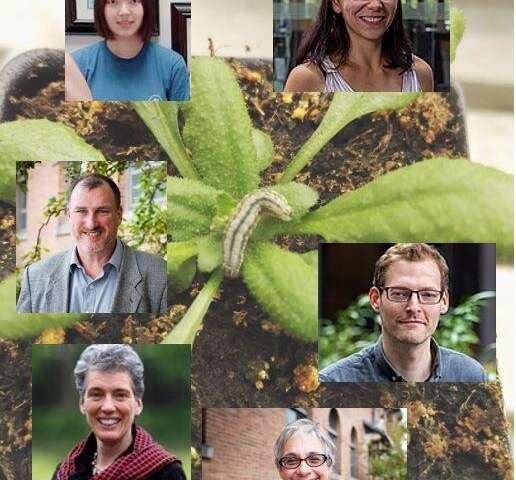First PhytoFrontiers paper discusses arabidopsis response to caterpillars

The PhytoFrontiers editorial board, led by editor-in-chief Nik Grünwald and associate editor-in-chief Steve Klosterman, is pleased to announce the publication of its first paper, "Distinct Arabidopsis responses to two generalist caterpillar species differing in host breadth," which comes from Jacquie Bede's lab at McGill University in Quebec, Canada.
"Zhang and colleagues provide characterization of biochemical and genetic defenses in the plant in response to generalist caterpillars and those specialist caterpillars with a narrow range," said Klosterman. "PhytoFrontiers seeks to publish a broad range of plant health topics and enthusiastically welcomes studies which contribute to the understanding of plant defense responses to herbivory."
Launched midyear, the broad scope PhytoFrontiers is an interdisciplinary gold open access journal that publishes high quality research covering basic to applied aspects of plant health.
"Research on plant-insect interactions at the molecular and biochemical level has much in common with research published on plant-pathogen interactions in APS journals, such as MPMI," Dr. Bede said. "I was excited to publish in PhytoFrontiers as it is a gold-standard open access journal."
Describing her background as diverse and non-linear, Jacquie studied biochemistry at the University of Calgary and gained exposure to medicinal plants and their specialized metabolites while working at a health food store in Toronto. From there, she combined her passion for plants and insects by earning a MSc degree in Botany and a Ph.D. in Zoology from the University of Toronto.
Now in the Department of Plant Science at McGill University in Quebec, Jacquie's research centers around plant-insect interactions.
"Plant-insect interactions represents such fascinating, dynamic multi-trophic interaction; in my lab, we try to tackle this with an understanding from both the insect's and the plant's perspectives," Dr. Bede said. "In particular, we are fascinated by strategies used by caterpillars to undermine plant defenses. The paradigm is that specialist caterpillars are able to cope with defensive specialized metabolites specifically found in their host plants whereas generalist caterpillars have strategies, such as interfering with phytohormone pathways that lead to induced plant defense by activating antagonistic pathways, that allow them to cope with a broad host range of plants that produce a diversity of different defensive compounds."
In their PhytoFrontiers article, Jacquie and colleagues, including first author Zhihong Zhang, who just completed her MSc studies and is interested in the regulation of plant responses to caterpillar herbivory, compare plant responses to two noctuid caterpillar species that are both considered to be "generalist" caterpillars. They investigated differences in plant defense responses from phytohormones to gene expression to specialized metabolites.
The research focused on plant responses to caterpillars of the cabbage looper, Trichoplusia ni, that feeds on different plants but prefers Brassicaceous plants such as Arabidopsis thaliana, and the beet armyworm, Spodoptera exigua, that feeds on plants in more than 30 different families. A. thaliana has distinct responses to these two caterpillar species. In response to beet armyworm herbivory, the plant activates the salicylic acid/NPR1 pathway that interferes with jasmonate-responsive pathway. In response to cabbage looper attack, A. thaliana did not increase its levels of glucosinolate defensive compounds, suggesting that it also manages to subvert induced plant defenses.
"These differences may reflect distinct effectors in the caterpillar labial saliva," explained Dr. Bede. "Beet armyworm labial saliva contains glucose oxidase, which generates the signaling molecule hydrogen peroxide, whereas cabbage looper saliva contains catalase, which decomposes hydrogen peroxide."
Editor-in-chief Nik Grünwald said "we are excited to publish this study from the Bede lab on Arabidposis-caterpillar interactions. We are particularly intrigued by the new twist that caterpillar species-specific, plant-induced responses might reflect differences in oral secretions of caterpillar effectors."
More information:
Zhihong Zhang et al, Distinct Arabidopsis Responses to Two Generalist Caterpillar Species Differing in Host Breadth, PhytoFrontiers™ (2020). DOI: 10.1094/PHYTOFR-07-20-0002-R
Provided by American Phytopathological Society